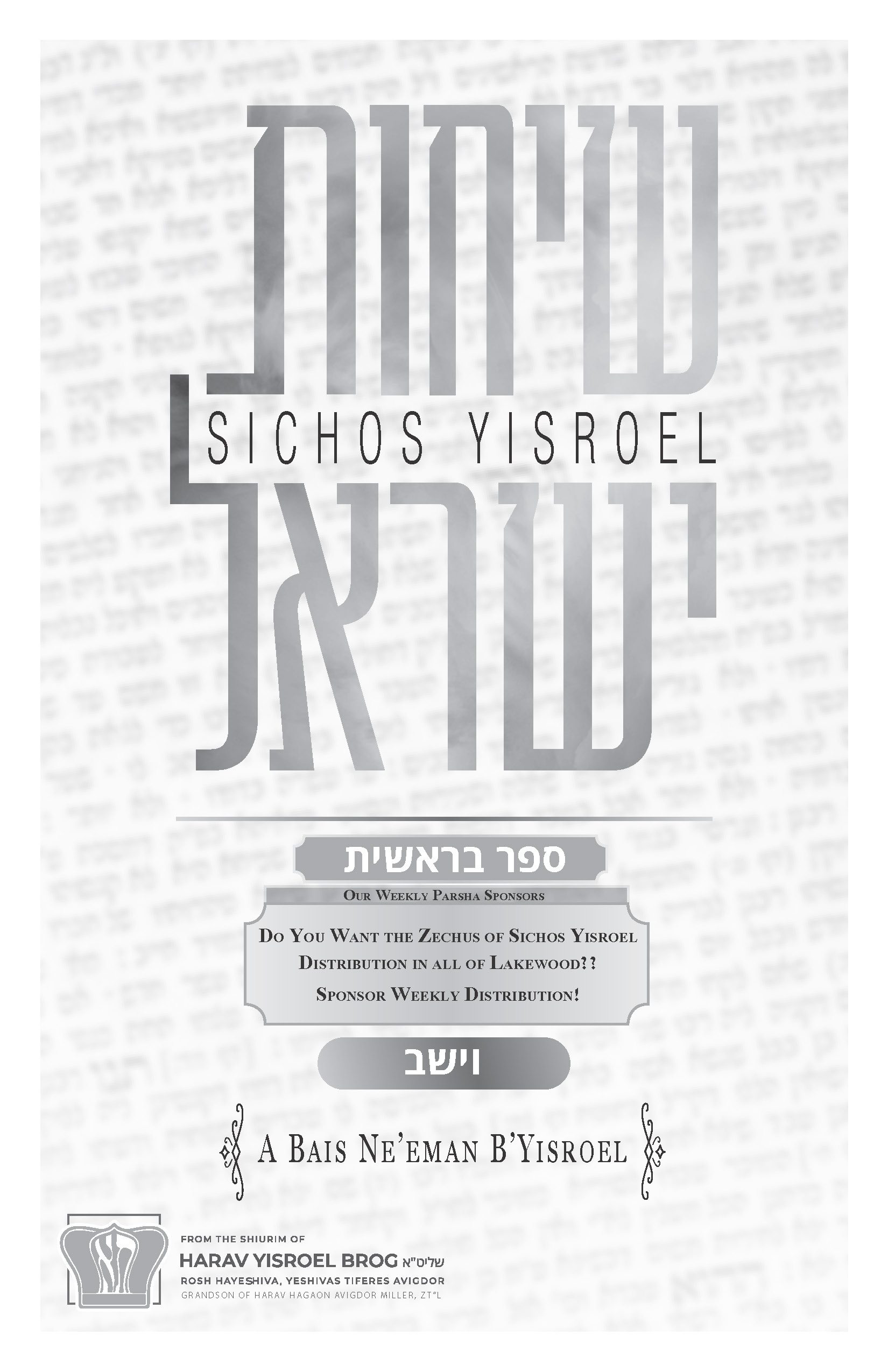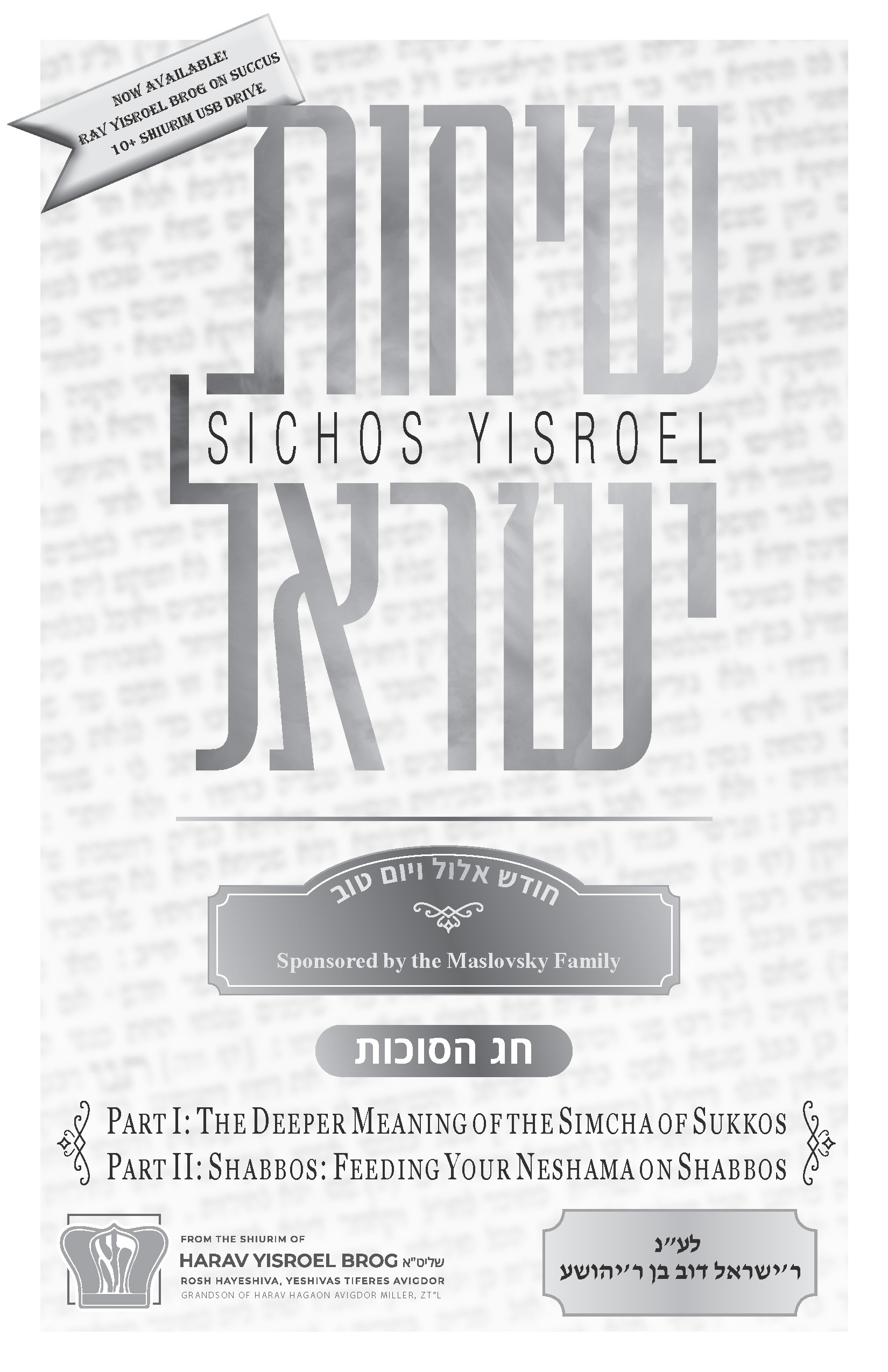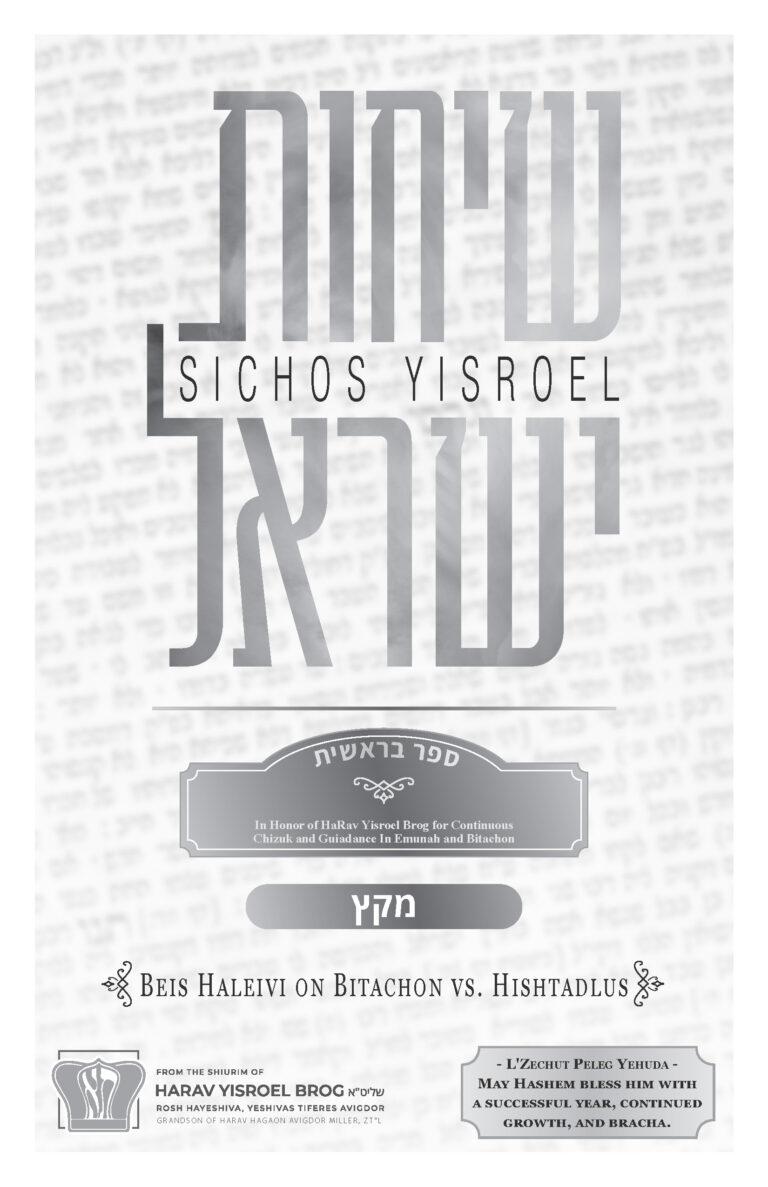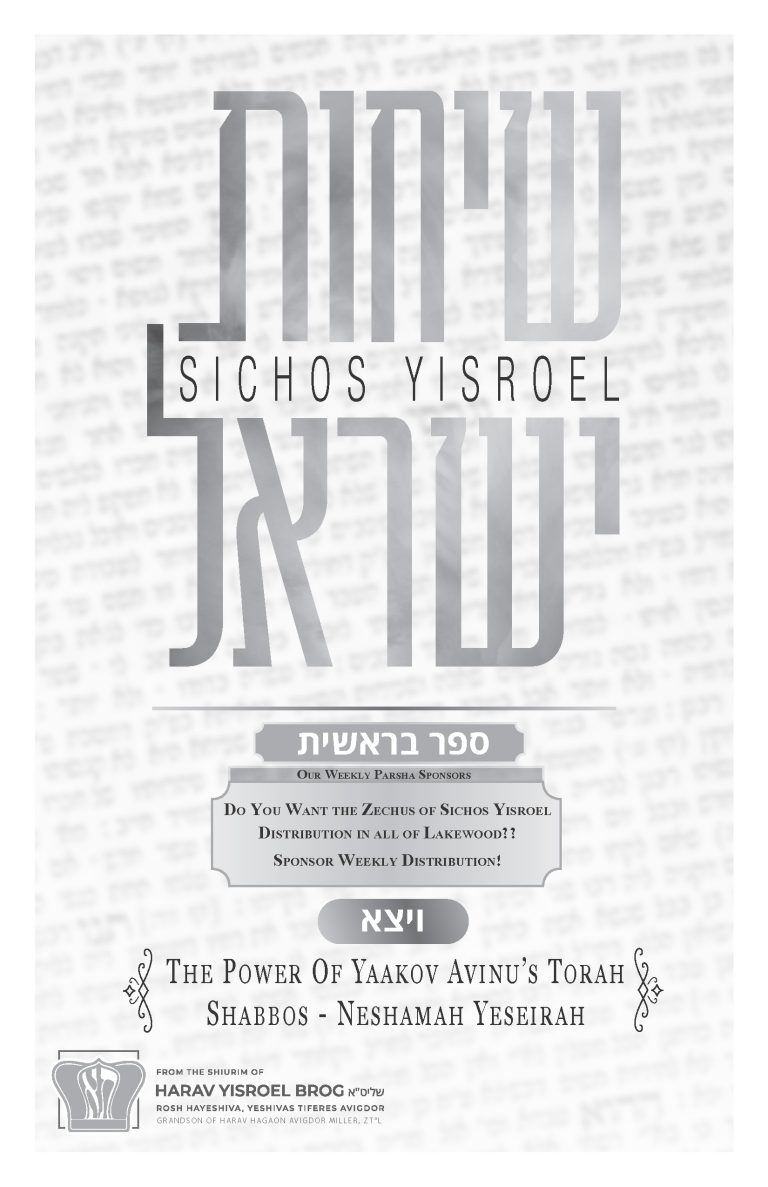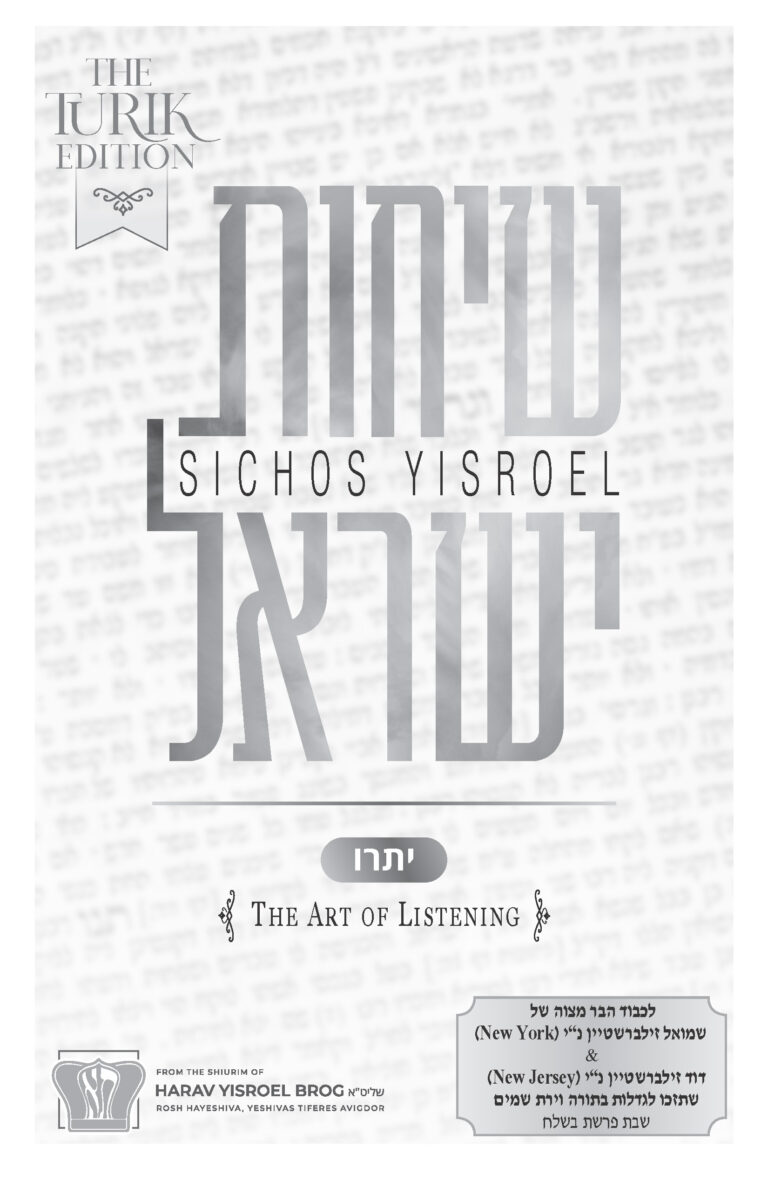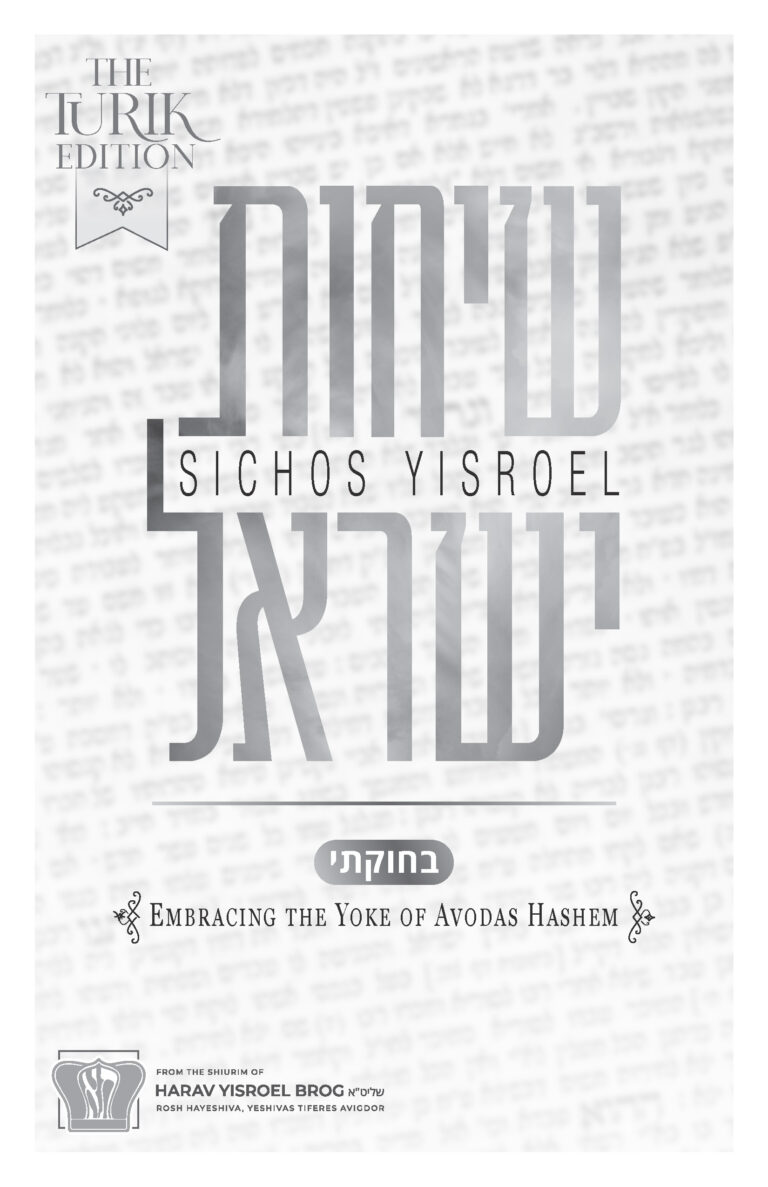Vayeishev 5785: A Bais Ne’eman B’Yisroel
Sponsored
Do You Want the Zechus of Sichos Yisroel Distribution in all of Lakewood??
Sponsor Weekly Distribution!
Consider sponsoring a shiur
Visit YTATorah.org
Shiur given in 5782
Parshas Vayeshev: A Bais Ne’eman B’Yisroel (5782)
The Purpose of Marriage
The big sugya in this parshah is the marriage of Yaakov Avinu to Rachel and Leah. There are many things that we need to learn and study and analyze from Yaakov’s marriage because they could be very relevant to us.
The first thing one must know when he thinks of marriage is: What is the tachlis of marriage? You have to know that when Yaakov Avinu got married, he just wasn’t getting married to propagate and have a nice Jewish family. Yaakov Avinu’s marriage was creating a nitzchiyus, an eternal bond. That is what is unique about Klal Yisrael. Avraham Avinu’s marriage was to build an eternal branch, an eternal tree. He was zocheh to be maamed all the shivtei kah, amazing accomplishment, and to lay down the roots for the future.
The first thing one has to know is when they are married, that is what they are doing. Most people, they give them a brachah, they should be zocheh to be boneh a bayis ne’eman beYisrael. You know why? Because a lot of them have no shaychus to bayis beYisrael. They punkt happen to be Jews who are getting married, but they are not adding to this tree. They are not plugging in to this shoresh and broadening the base and building this netzach, this eternity.
In the sheva brachos we say: וְהִתְקִין לוֹ מִמֶּנּוּ בִּנְיַן עֲדֵי עַד – “and He fashioned for him out of his very self a building (i.e. Chava) for eternity.” It’s amazing. When I thought of that, it was overwhelming to me. This means that my wife and I are pashut building a binyan עֲדֵי עַד. That’s what it is. It’s not a stam binyan, not a stam bayis. It’s a good structure to have organization, to have families, neighborhoods, you have yishuv. Having children is – the gemara says, lo sayu bra lasheves yetzara, it’s a good zach to have children. It builds up the yishuv. Marriage, however, is much more than that. That’s why we call it a bayis ne’eman beYisrael. Are you being loyal to the history of marriage in Yiddishkeit?
How Is Marriage Different From The Bris Milah?
The word nisuin means uplift. That’s what it is. A nisuin means, you uplift. The bond that you make with your wife – when two of you were independent before, but now come together – becomes uplifting.
The gemara says that a person who is not married is a plag guf, he’s a half a guf. Yaakov Avinu through his marriage to Rachel and Leah had a tremendous elevation. He was zocheh to such a nisuin! Lo kol hanisuin shovoi zu lezu, they are not all the same. Somebody who is more uplifting makes a greater nisuin.
My Rebbi (R’ Meir Halevi Soloveichik) once told me that the Brisker Rav was at an einikel’s bris and a man came over very excitedly and he said, “Ah, mazel tov, mazel tov!” The Brisker Rav said, “Why are you so excited?” He said, “A groise bris!” The Brisker Rov said, “What do you mean, a groise bris? Every bris is the same, you’re nichnas into Klal Yisrael.” “The Brisker Rav’s einikel,” the guy finally said. The Brisker Rav told him, “Neh, alle brissim sennen de selbe, all brissim are the same.” No groise brissim. Maybe you have more lox, less lox, more meat, less meat, ich veis vos, but the bris itself? The baby is becoming a member of Klal Yisrael.
With marriage, it’s not like that. The uplifting nature of marriage is to the degree that a person elevates himself and actually attaches himself to the trunk of Klal Yisrael, so to that degree it could be a groise nisuin. Orit could be the opposite, where the guy produces some dried out branches and doesn’t manage to graft himself onto the trunk of the nitzchiyus of Klal Yisrael.
Kiddushin Means Taking Achrayus
The lesson of one of the most important things that has always bothered me in this parsha can be seen when Yaakov Avinu was facing a marriage without any funds. He had no jewelry, he had no money. He had nothing to offer. He was bereft of all. But you might have thought that Yaakov Avinu would have figured, “If Hashem doesn’t want me to have money, that means I’m going to get married without money.” That’s what I always thought. But on second thought, I realized it’s not like that. Yaakov Avinu had to pay such a steep price for his marriage, it is mind boggling. Mind boggling! He had to work his first stint seven years of avodah mufreches, backbreaking work. He worked day and night. And he wasn’t like us, where he slouched off, or he wanted a four-day work week. We like to work five days a week. Yaakov worked the whole week. And he said evadcha, I’m going to be your eved for seven years. I was amazed, why did he say seven years? Why didn’t he say, “I’ll work for you for a year, a few months and afterwards we’ll see.” Seven years? That’s amazing. It’s mind boggling!
You know what the pshat is? The pshat is like this. You have to know that what is the kinyan of kiddushin? The kinyan of kiddushin, getting married, is a person accepting responsibility for his wife. Most people don’t understand that the chiyuv of kiddushin, the achrayus of kiddushin is the baal to the ishah. The ishah is mekabeles and the baal does the ma’aseh kichah, “the act of taking.” It says ki yikach ish ishah. You know what a woman’s role in marriage is? To put her hand out and receive the gifts. Today, there is a mishugaas, the woman gives her husband gifts also. But in the Torah’s time, there was no such thing! All the gifts came from the husband! He plied the wife with gift after gift after gift! And the wife’s role is to be only a mekabeles.
The gemara says that if a lady is mekadesh a man, it’s not a valid kiddushin. That kiddushin falls apart. It doesn’t start. It’s not chal. Ladies can be silent. Whenever I officiate at a marriage, I mention to the wife, “You are doing nothing. You are sitting here and you are accepting the act of kiddushin from your husband to be. Don’t say you are marrying him. He is marrying you and you are accepting your marriage and you are becoming mekudeshes. He is the mekadesh.” So you know what a mekadesh means? A mekadesh means, I am going to accept achrayus for you. That’s what it means. That’s an amazing thought. Many people don’t know that. They think, what is she going to do for me? What is her family going to do for me?
A Working Wife: A Lack of “Ki Yikach Ish”?
You know, in the Torah there is no concept of a wife working for her husband. The Torah’s concept is a man provides for his wife. That’s the Torah’s concept. A moradige chiddush arose about 150 years ago, which was unheard of before. Especially, in the last 70 years, a concept arose that was never heard of before and became an accepted norm. Even in Europe before the war, this concept wasn’t heard of. I am specifically talking about a wife supporting her husband. And it’s very common for people nowadays to ask, “Does she have a good job, does she have a shvache job?” People want to know how much money the wife’s parents are going to give them. That kind of marriage lacks ki yikach. There is no achrayus from that husband. He is not being mekadesh an ishah.
Does that mean that a lady can’t work? No. Let’s say a lady says to her husband, “My dear husband, I would love for you to learn Torah, so I’m willing to forgo your providing for me. I’m mochel you. You don’t have to provide for me. And I would like to work so that you could learn.” She could do that 100%. And that’s amazing.
I’ve gotten many calls from people who ask that their husband wants them to go to work to bring in more funds, and they say, “But I’m a wife.” I say to them, “What does your husband do?” Answer: “He works.” I said, “If your husband works, tell him to work harder. You have no obligation whatsoever to go to work.” I’ve even told this to kollel people, that if the wife says, “I can’t do it anymore,” I’ve told many husbands, “I’m very sorry to disappoint you, you must take achrayus now. That’s your chiyuv, to take the achrayus. That’s how the Torah looks at marriage.”
Yaakov Avinu worked seven years for Rachel. That’s called taking achrayus. And Yaakov Avinu was doing tremendous avodas Hashem. Don’t think this was a sidekick, a side job that he had to deliver papers and then play with Lavan’s sheep. No. He understood that it was an avodas Hashem she’ein kemoso. And every husband should see and look at his life as if he is doing tremendous avodas Hashem. To accept achrayus for a woman is a tremendous Avodas Hashem and chiyuv min HaTorah.
What Every Chassan Should Know!
I want you to know that when the Rambam writes about the mitzvah of getting married, you know how he writes down the mitzvah?[i] He says לישא אישה, to marry a woman, בכתובה וקידושין. So the mefarshim all ask, “בכתובה”?! That’s a separate zach. There is kiddushin, which is a marriage. But kesubah is something that came about afterwards. Rabanan didn’t want to make it easy to get rid of a wife, so they figured they’ll tack on a charge so the guy will think twice if it’s worth it. That’s what the gemara (Kesubos 39b) says: שלא תהי’ קלה בעיניו להוציאה. So how did the Rambam write, the mitzvah is to marry a woman בכתובה וקידושין? The halachah is, that a man is not allowed to live with a woman if he doesn’t give her a kesubah. And I’ll tell you an even bigger chiddush.
You don’t have to know where your ring is. Once you give the kiddushin, you give the ring, your wife could lose the ring, it doesn’t make a difference. But if you don’t know where the kesubah is at any time during your marriage, you can’t be in the house alone with your wife. I can’t tell you how many times I got a call at 12 o’clock, “I can’t find my kesubah.” I say, “Well, if that’s the case, step out of your home, buddy. You can’t be home alone with her.” You have to be aware of where your kesubah is. You don’t have to have it in your house. That’s even more important than the ring! Your wife may be disappointed if she loses the ring and you may be disappointed as well, yet you’re not disappointed if you lose the kesubah. The fact of the matter is – the kesubah is more important.
So what’s the pshat in this Rambam? What does the kesubah say? The kesubah says, “Ana eikar,” I’m going to respect you. You know what respect means? You say, “I’m taking achrayus for you to feel important.” Did you hear of a chassan who knows and understands that this is what his responsibility for marriage is? “I’m going to make my wife feel important.” Every chassan has to know this!
I have to be honest with you. When I got married, I was young and dumb and I didn’t know that. I thought she was supposed to make me feel important. But it’s not what the Rambam says. In the kesubah it says, “I’m going to respect you.” And then, as an eizor – “I’m going to support you, I’m going to give you clothing, I’m going to provide a home for you.” There are a lot of obligations there. Do I have the money? Do I have the ability? That’s what you get married for.
Kesubah and Kiddushin Must Be Together!
You have to know, kesubah and kiddushin are together because that is what kiddushin is! A kiddushin means, “I am being mekadesh you, I am accepting full responsibility for you.” When you support your wife, that places her in your reshus. When you tell a woman, “I am going to be achrai for you, I am going to be responsible for you to feel important,” you are fulfilling your most basic responsibility of kiddushin. How many people talk down to their wives? How many people berate their wives? A lot of people do! A lot of people talk this way: “You don’t bring in money, you don’t bring in this, you’re not this, you’re not that.” You should know that that guy is mamash voiding his kiddushin!
So that’s your chiyuv. And when you do that accept the responsibility, you know what happens? The wife is now nichnas l’reshus’cha. She comes into your domain. And the more you are mechabed her and the more you support her, the more she comes into your reshus.
The gemara says that an ishah is koreses bris, she forms an unbreakable bond to the person who makes her a keili. Keili is a receptacle that holds things. If a guy gives his wife $25 a week, so he’s turning her into a thimble, a bottle cap. That is gornisht. You’ve got to make a keili where you’re going to put lots of good stuff in that keili. And then she’s nichnas to you, she becomes loyal to you. Whenever you see shalom bayis problems, you know what the man always says? “My wife doesn’t respect me.” You know what my response is? “You probably don’t deserve any respect. You don’t take care of her. You’re not mekabel achrayus.”
Are You Living Up To Your Responsibilities?
Not long ago, a bum came to me, a guy who sleeps most of the day and almost every day he was complaining to me that his wife did nothing. I said, “Does she work every day?” He said, “Yes.” I said, “You’re a bum. If I was advising your wife, I would tell her not to go to work for a second. You’re an absolute bum! You were never even mekadesh your wife!” He kept going: “But my wife doesn’t do this or that.” I said, “You’re lucky she stays in the same house with you! She’s nuts for doing that! You don’t live up to any of your responsibilities! You don’t take any achrayus for her. You just use her.” That’s not a marriage!
There is a passuk in the chumash (Devarim 24:5) that says when you get married, וְשִׂמַּח אֶת אִשְׁתּוֹ. Rashi says, it doesn’t say vesimach im ishto. It says vesimach es ishto. What does that mean? What is the difference between being mesameiach es ishto and being mesameiach im ishto?
So Rav Chaim Stein (1913-2011), Telzer rosh yeshivah, once told me an interesting thing about this Rashi. He told yungerleit when they got married, there is a certain minhag. They started a minhag in America, which is not a normal minchag, that when you get married, you don’t go to night seder. The first year you don’t learn. It starts with the first year. And then after the first year, you say, “Well, I wasn’t yotzei the first year,” so you’re mamshich the second year and it goes your whole life like that! So he used to say, “Why don’t you learn night seder? Because it says in the passuk וְשִׂמַּח אֶת אִשְׁתּוֹ.” He said, “Did you ever look at what Rashi actually says?[ii] Rashi doesn’t say vesimach im eshto, “rejoicing together with your wife.” It says, you are responsible to see to it that your wife is happy. You have to figure it out. Are you deciding if you want to be rejoicing with your wife?! No, it doesn’t say that in the Torah anywhere.”[iii]
And then I’ll tell you another pshat. I didn’t hear that from him, but there is another pshat, a moradige pshat. What is the difference between im and es? If I’m having fun with you, or I’m giving you fun. If I’m having fun with you, then I’m saying, “I’m partying with you,” you know what that means? I am making my contribution, I contribute my part and together we party. But let’s say you don’t contribute your chelek, so I’m not going to contribute either. וְשִׂמַּח אֶת אִשְׁתּוֹ says that the man is fully responsible to see to it that his wife is besimchah. Whether she gives it back to you or not, whether she contributes or not. You’re not partying together with her. You’re making her besimchah. It’s not about making yourself besimchah. There is no such a tenai that she has to be mesameiach you. Rabbosai, that’s a real Torahdike hashkafah. You have to be mesameiach her. You work for her! Do you understand this?
Now, of course, an ishah tzidkonis that sees her husband working for her and doing for her and being mechabed her, you know what that lady says? “I’m going to love you back and I’m going to be mechabed you back.” It’s amazing. A person has a responsibility to be mechabed her yoser migufo. You have to be mechabed your wife more than your own guf. That’s one halachah I had a very difficult time with, I have to tell you.[iv] Respect her more than myself?! Maybe equal, maybe. But more? It’s a very shver zach. But that’s your chiyuv. You have to know, that’s what your chiyuv is. It’s very scary because most people take their wives a little bit for granted. A little bit. She got married to me, so I use her. You don’t say it like that, of course. You say it nicely. Couch it in American terms, PC terms.
Yakov Avinu Demonstrated Achrayus
But the emes is that Yaakov Avinu demonstrated middas haTorah in this regard. Can you imagine going to work and tending sheep for seven years?! Could you imagine the bitul Torah involved here? I mean, it doesn’t say he hired people and he just sat in the beis medrash while a bunch of shepherds took care of the sheep. It doesn’t say that! He himself did that avodah. I’m thinking, “Yakov Avinu – the bechir of our Avos – is shearing the sheep, cleaning up their tzoia!” Sheep go to the bathroom, you’ve got to clean their tzoia. They don’t clean by themselves. The shepherds did everything. And all for what? For his wives. He demonstrated achrayus like nobody’s business.
That’s how you have a solid and healthy marriage. And you have to get your head on straight to know when it says (Yevamos 62b)[v] that if you’re without a wife, you are shari belo brachah. You know what that means? If you turn your wife into a wife, then you know what happens? Your wife, number one, wants to do for you more than you could imagine, if you make her feel good, if you take achrayus for her.
I know many people whose wives work and they take the check. The husband has no right to that check al pi halachah. She could say to him, “I’m working for myself, you’re not supporting me, I’m supporting myself, so I’m going to take the check.” What’s the husband going to say? “Nah, that’s not the way it’s done.” She says, “Why not?” He says, “There is no such thing.” A person has to know, you’d better think of how you would fulfill what it says in the kesubah: וַאֲנָא אֶפְלַח וְאוֹקִיר וְאֵזוֹן (“and I will cherish, honor and support you”). How and what are you doing for your wife to make your wife feel indebted to you?
Your Wife is Not Your “Mommy”!
Many people have this concept that wives are not so interested in their husbands. They say, “That’s how it is.” It’s not how it is. They are very interested in their husbands. But they are only interested in their husbands who act like husbands! When they have to be the “Mommy” of the husband, which is a personal thing that I have and it disgusts me – everyone who does, you should excuse me. I love these guys who turn to their wife and ask, “Mommy, what should we do, Mommy?” I look at him, “Where’s your mother?” I asked one guy who called his wife this way, “Where is your mother? Isn’t that your wife?” “Yeah, but I call her Mommy.” I told him, “You know that it says, עַל כֵּן יַעֲזָב אִישׁ אֶת אָבִיו וְאֶת אִמּוֹ, you’re supposed to leave your Mommy and you are וְדָבַק בְּאִשְׁתּוֹ (Bereishis 2:24). You know what that means? A guy who calls his wife Mommy wants his wife to be mekabel achrayus for him! Maybe by some people it’s not like that, but if it is like that, that’s not what a bayis ne’eman beYisrael is supposed to look like.
Not To Be Taken Lightly
A bayis ne’eman beYisrael has to look like that a person is building her up. Not by calling her Mommy, but taking care of her. “Mommy we’ll do it this way. How would you like to do it?” You could go down and you could listen to her, respect her. There is such a concept. Yaakov never was upset. If it was my Torah, I would have written, vayeira hadavar me’od be’einei Yaakov. Yaakov was very disappointed. After 14 years in Beis Ever, he probably wanted to sit down and learn a little bit, get married, and have a family. But he was working like a horse. It was avodas Hashem. That’s what a marriage is, and that’s what we have to understand. We have to revisit our relationships and think: “Does my wife feel built up from me? Does my wife feel that I am somebody who respects her and makes her feel important?”
I once heard a moradige diyuk. In the gemara it says, what is the purpose of a kesubah? It says (Kesubos, ibid) שלא תהי’ קלה בעיניו להוציאה. So it shouldn’t be easy in his eyes to get rid of her. But somebody said, if you look closely at the gemara, the gemara doesn’t say what everybody thinks it says. It doesn’t say שלא תהי’ קלה בעיניו להוציאה. It doesn’t say that it shouldn’t be easy in his eyes to get rid of her. It says ‘שלא תהי, so that she should not be קלה בעיניו! Hashem wants that your wife should not be taken lightly in your eyes. You should look at her as a davar chashav, as something of value. It’s an oifen of respecting her. It’s not an oifen just to prevent you from not doing hasty things.
Seven Years of Work – A Small Price To Pay!
It says in the passuk (Bereishis 29:20): וַיִּהְיוּ בְעֵינָיו כְּיָמִים אֲחָדִים בְּאַהֲבָתוֹ אֹתָהּ – “and in his eyes the seven years of working for Rachel seemed to him but a few days because of his love for her.” So everybody asks a famous question. How does that work? If you worked for somebody for seven years, wouldn’t you feel a little overworked? Would you feel that’s like one day?! I never heard of that. If anything, it’s the opposite. If I want something very desperately, every minute feels like a year! It doesn’t feel like it’s יָמִים אֲחָדִים. Good question.
So I saw the Rosh asked this question. He says, it doesn’t mean that the work passed by quickly. Adaraba, he says, it passed by very slowly because he wanted to get married to Rachel. But you know what כְּיָמִים אֲחָדִים means? He said, the price he was paying for Rachel, seven years of work, was a very small price to pay to be zocheh to Rachel Imeinu! Ah! That’s the pshat. You hear that?! You know how Rachel must have felt, when she heard that?! That this man was working seven years and to him, it felt like a small price to pay to be zocheh to marry her. That’s what kiddushin is, rabbosai! That’s what nisuin is. That kind of kiddushin and nisuin brings netzach, rabbosai, it brings nitzchiyus, eternity!
You have to look at your wife in the following way. Without your wife, you’d be half a person, literally. You’re a gornisht. Half of a person is a gornisht. Your wife who agreed to marry you because of your small commitment you made to her turned you into somebody. From a half you went to a whole. That’s why you have to be mechabed her יוֹתֵר מִגּוּפוֹ. You know why? Because she turned you into יוֹתֵר מִגּוּפוֹ. Before your wife, you were a chatzi guf and now your wife turned you into a shalem. Ai, you don’t feel it? Because you’re a small, little, midget of a human being and your IQ has never been tested, and, no, don’t test it now either. Because if you test it, you may discover it’s below the level of most of humankind and you don’t realize that your wife did you a favor and she helped you become elevated. Ai, you didn’t use the opportunity, you just kept on bothering yourself. “Your nose, I don’t like your nose. I always had a problem with your nose. Your nose always bothered me. Or your eyes.” You’re such an animal, you’re such a beheimah, that’s what bothers you, that this is what you’re busy with?! Did you ever live up to the achrayus you told your wife you were going to do for her?! Did you ever lift her up and make her feel like a million dollars?! No.
Hakadosh Baruch Hu should help us realize and appreciate our wives and our marriages, and when you’re going to get married, you should realize what the hatzlachah of a marriage is and what the achrayus of a marriage is.
The Bottom Line
We can learn a lot from Yaakov Avinu’s marriage. Firstly, we must understand the purpose of marriage – creating eternity and laying down the roots for the future of Klal Yisrael. We must connect to the roots and broaden the base of the tree. Marriage is a בִּנְיַן עֲדֵי עַד – an eternal building that gives us opportunity for nisuin, uplifting, of ourselves. The more a couple attaches themselves to the trunk of Klal Yisrael, the more uplift there is in the marriage. Secondly, the fact that Yaakov Avinu worked seven years for Rachel shows that he took achrayus for his future family seriously. The Torah’s concept of marriage is that a man provides; to accept achrayus for a wife and family should be seen as true avodas Hashem. Thirdly, we see that a kesubah which delineates the obligations of the husband, is more important than a ring in representing a marriage. The kesubah includes respecting the wife and taking care of her. The husband must develop the means and the ability to fulfil these obligations. Hashem wants the wife to be seen as someone chashuv in the marriage and doing so, makes the wife into a vessel for blessing in the marriage. This week I will (bli neder) think about the chashivus of marriage and about the multifaceted concepts that marriage represents for a couple and towards Hashem and Klal Yisrael.
[i] הלכות אישות. יש בכללן ארבע מצוות – שתי מצוות עשה, ושתי מצוות לא תעשה; וזה הוא פרטן: (א) לישא אישה בכתובה וקידושין; (ב) שלא תיבעל אישה בלא כתובה וקידושין; (ג) שלא ימנע שאר כסות ועונה; (ד) לפרות ולרבות ממנה (משנה תורה, תוכן החיבור ד׳:ג)
[ii] ושמח. יְשַׂמֵּחַ אֶת אִשְׁתּוֹ, וְתַרְגּוּמוֹ “וְיַחְדֵי יָת אִתְּתֵהּ”, וְהַמְתַרְגֵּם וְיֶחְדֵּי עִם אִתְּתֵהּ טוֹעֶה הוּא, שֶׁאֵין זֶה תַּרְגּוּם שֶׁל וְשִׂמַּח אֶלָּא שֶׁל וְשָׂמַח
[iii] Ed. note: Rashi disagrees with the Targum Yonosan’s translation of וְשִׂמַּח, by pointing out that the word וְשִׂמַּח in the pasuk is not a pi’el form of the verb, like the Targum translates it (i.e. a causative verb, “be glad with his wife”), but rather, וְשִׂמַּח is in a pa’al form – (i.e. וְשָׂמַח, direct action verb), which means “he shall gladden his wife.” He shall see to it that she’s glad.
[iv] וְכֵן צִוּוּ חֲכָמִים שֶׁיִּהְיֶה אָדָם מְכַבֵּד אֶת אִשְׁתּוֹ יוֹתֵר מִגּוּפוֹ וְאוֹהֲבָהּ כְּגוּפוֹ. וְאִם יֵשׁ לוֹ מָמוֹן מַרְבֶּה בְּטוֹבָתָהּ כְּפִי מָמוֹנוֹ. וְלֹא יַטִּיל עָלֶיהָ אֵימָה יְתֵרָה. וְיִהְיֶה דִּבּוּרוֹ עִמָּהּ בְּנַחַת. וְלֹא יִהְיֶה עָצֵב וְלֹא רַגְזָן (משנה תורה, הלכות אישות ט״ו:יט)
[v] אָמַר רַבִּי תַּנְחוּם אָמַר רַבִּי חֲנִילַאי: כׇּל אָדָם שֶׁאֵין לוֹ אִשָּׁה – שָׁרוּי בְּלֹא שִׂמְחָה, בְּלֹא בְּרָכָה, בְּלֹא טוֹבָה. בְּלֹא שִׂמְחָה, דִּכְתִיב: ״וְשָׂמַחְתָּ אַתָּה וּבֵיתֶךָ״. בְּלֹא בְּרָכָה, דִּכְתִיב: ״לְהָנִיחַ בְּרָכָה אֶל בֵּיתֶךָ״. בְּלֹא טוֹבָה, דִּכְתִיב: ״לֹא טוֹב הֱיוֹת הָאָדָם לְבַדּוֹ״.
